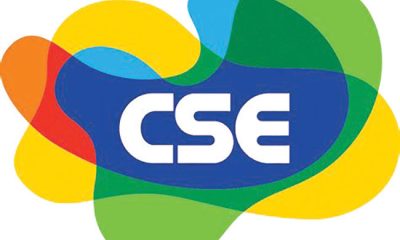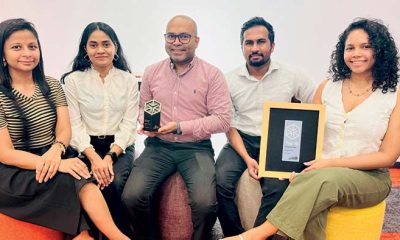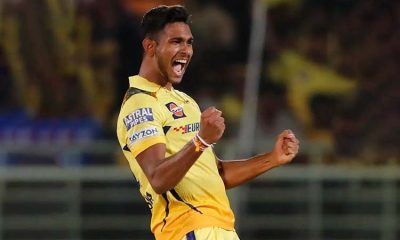Politics
LIBERATING LANKAN LIBERAL DEMOCRACY
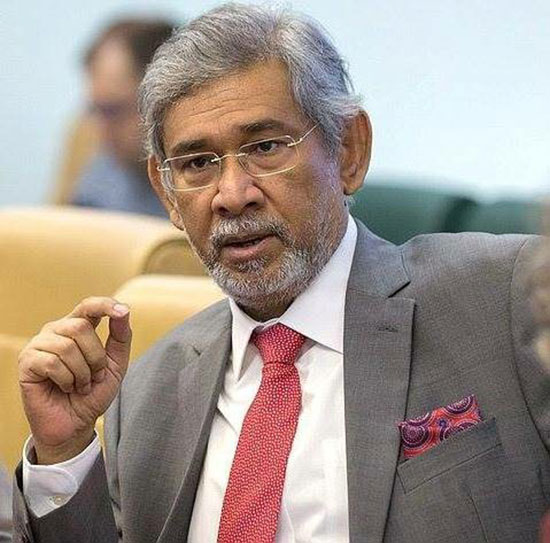
DR. DAYAN JAYATILLEKA
In successive waves of democratization beginning in the 1970s in Portugal, and the 1980s in Poland and the Philippines, autocracies were pushed back through a combination of popular unrest, triggered either by economic crisis or some morally outrageous incident, and external pressure, ranging from solidarity through Congressional cut-offs to coercive interventionism.
The zenith of this historical process led to the famous thesis of the “end of history”, by which it was meant that though liberal democracy would be challenged by parochial foes, it could no longer be challenged as a model which claimed universality.
What was not anticipated is that liberal democracy would be challenged from within, most dramatically in its metropolitan centers, not only by neoconservatism but worse, by ultranationalism, most notoriously in the case of the Trump presidency. The process of an internal, ultranationalist counter to liberal democracy commenced in places as diverse as Eastern/Central Europe which had been the exhibits of the revolution of democracy against socialism, and in Israel under Netanyahu. Ethno-religious ultranationalism, even nativism, became the trend, in several cases (not Israel) fused with autocracy.
Netanyahu exported the counterrevolution against President Obama’s progressive liberalism, to the USA itself, feeding into the rightwing counterrevolution that dated back to the backlash against Bill Clinton’s presidency and manifested itself in the Tea Party Movement. It now seems to have captured the Republican party itself. Gotabaya Rajapaksa lived through that process in California. He and his wealthy Sri Lankan friends, including ex-military men, were very much steeped in rightwing Republican ideology and politics. That was the birthplace of the GR Presidency project.
What the liberal democratic ideologues had not anticipated, though the better ones protested and prophesied as things became obvious (Joe Stiglitz, Paul Krugman, Robert Reich, Jeff Sachs) that the adoption of neoliberal economics had ripped society apart to such a degree, that it has generated a neoconservative, ultranationalist, populist backlash that would threaten liberal democracy itself. There had been another way to go, and the person who first pointed the correct way was the man who perhaps more than any other, had morally and ethically catalyzed the peaceful overthrow of the socialist one-party model: Pope John Paul II. Having overthrown the old enemy of the church, Communism, he swiftly pivoted to a blistering critique of free-market fundamentalism (and visited Cuba, exhibiting great friendship with Jesuit-educated Fidel Castro).
Western liberal leaders weren’t listening. Liberal ideologues and policymakers had another way to go to avoid disaster. Had they dusted off TH Green and LT Hobhouse, or re-read JS Mill, or still more simply, understood President FDR’s Four Freedoms, they would have discovered a socially more responsible and progressive liberalism. Instead, the liberal democrats preferred the economic theories of those who were far from liberal democrats themselves, ranging from Hayek to Milton Friedman. The latter and his acolytes actually applauded and advised the most notorious military dictator of our lifetime, Chile’s General Augusto Pinochet, when he seized power in a bloody military coup, overthrowing elected President Salvador Allende.
Things echo and re-echo in history. It is no accident that the United Nations World Social Summit in Copenhagen 1995 was spearheaded and chaired by Ambassador Juan Somavia, a close associate of President Salvador Allende. (I was privileged to work closely with him when he was Director-General ILO and I was elected Chairman.) The declaration is perfectly compatible with that of the SAARC Independent Poverty Commission appointed by President Premadasa as SAARC Chairman a few years before. The Copenhagen Summit and earlier Pope John Paul II, not only clearly warned about the turmoil that economic neoliberalism had unleashed but also pointed to the solutions. It is the failure to implement this program that left the door wide open for ultranationalist populism to win working class votes and areas in the UK and USA.
Liberal democracy and modernity are siblings. Liberal democracy cannot be defended from ultranationalist autocracy by cosmopolitan-neoliberalism. Modernity cannot be defended from nativism by post-modernism.
Liberal Democracy & Opposition Unity
Sri Lanka is the oldest democracy in a region of the world covering two continents, including the planet’s most populous; Afro-Asia. Sri Lanka is now, and arguably has been for some time, an illiberal or authoritarian democracy. It is an illiberal democracy in transition to something else; something densely darker: to autocracy/ despotism/tyranny either of a civilian-military sort which appeared in some Latin American states decades ago or a military-backed Presidential autocracy such as the dictatorship of President Marcos of the Philippines.
There are two clear drivers in that direction: the 20th amendment to the Constitution which makes for hyper-centralization of power, and the process of militarization. An outright Myanmar-type junta is a possible outcome in a worst-case scenario.
Those well-meaning pro-Opposition elements who prattle on that ‘we must bring everybody onto one platform’ must ask themselves whether or not the presence on the platform of party, caucus or personality—such as Ranil Wickremesinghe and Mangala Samaraweera—will bring in more votes or deprive the democratic opposition of quite a few votes as in November 2019. It seems to be their sentiment that nationalist voters are dispensable or should actually be shunned in favor of cosmopolitan globalist (neo)liberal democrats.
Lankan neoliberal democrats are uncritical of ex-Finance Minister Mangala Samaraweera’s snide remarks on Sajith Premadasa and socialism, while ignoring the categorical statement by the architect of the open economy, Ronnie de Mel, holder of a first-class honours degree in History from the prestigious old university of Ceylon, and honored guest of Gordon Brown when he delivered his inaugural Budget as the Chancellor of the Exchequer. De Mel went public earlier this year, expressing his alarm on the state of the economy, repeatedly saying that Sajith Premadasa is the only hope for the country, urging Mr. Premadasa that our macroeconomic policy needed to focus more on social equity and urging an infusion of socialist values into the mix.
Where in the global south has rightwing ultranationalist or ultranationalist-militarist autocracy been displaced by liberal democrats, with a liberal democratic project and program?
Can anyone with a lucid mind believe that in a country where two-thirds of an ethnic majority which itself comprises and overwhelming two-thirds of the populace, shifted in one direction, that of ultranationalist-militarism, these voters of the heartland can be shifted back by means of a ‘liberal democratic project’ or ‘program’ or ‘alternative framework’? Rather, does it not require a social democratic program with robust populist appeal?
Lankan neoliberal democrats never defended really existing devolution which Vijaya Kumaratunga advocated and for which he and 117 members of his political party paid with their lives. They never stood for the implementation of the 13th amendment, not even the full implementation of the 13th amendment. Instead, they strove for a new constitution which went far beyond the 13th amendment. This wasted the time and sociopolitical as well as ideological capital of the Chandrika presidency.
The Lankan neoliberal democrats who condemn the SJB and Sajith Premadasa as being ‘SLPP Lite’, expect the tectonic shift of the Sinhala Buddhist voters to the SLPP to be reversible by a liberal democratic program, which means that those voters, an unprecedented majority can be expected to vote for the UNP’s neoliberal democracy.
By contrast, the US Democrats were smart enough to know that Trump could not be beaten this time around by recycling the Hillary Clinton candidacy. They would not shift all the way back. Nor were the voters in the heartland states progressive enough to shift to Bernie Sanders i.e., they would not go all the way forward. A progressive, semi-populist centrism as represented by Joe Biden, was the best bet to save liberal democracy.
Those who meaninglessly call for Opposition unity which includes Ranil and Mangala do not seem to know that anti-militarization and anti-militarism are imperative, but have to kept separate and distinct from an anti-military ideology and profile. The Ranil-Mangala neoliberals, fans of “foreign judges” and federalists, would antagonize the military which needs to be won over or neutralized in the democratic transition i.e., in any successful democratization strategy to detach the military and defeat the despotic dynasty.
Lenin in his typically trenchant manner, sardonically remarked about “some comrades who think that minus three is greater than minus two”. What matters in any unity formula is not the number of parties or organizations present and included but whether they bear a plus sign or minus sign in front of them, in the popular consciousness and the political equation. So long as the UNP is led by Ranil Wickremesinghe, and the Mangala Samaraweera caucus remains repentantly neoliberal and anti-nationalist, they are preceded by a minus sign, not a plus. What they take away from the table is far greater than what they would bring to it.
The defense of Lankan liberal democracy is too important to be left to the Lankan liberal democrats. In order to save liberal democracy in Sri Lanka, it may be necessary to liberate it from Lankan liberal democrats.
The real success story of sustainable Covid control– and way before the vaccine rollout– is not the Gotabaya government’s pinup, China, but New Zealand. It is an excellent advertisement for social democracy as the world’s best political idea and social policy model.
So as to save Sri Lanka’s liberal democracy, Lankan liberal democrats “must commit suicide and be reborn” (to use the classic phrase of African national-liberation leader and intellectual Amilcar Cabral) as social democrats. Only social democracy can save liberal democracy, arguably globally, but unarguably in the global South, and indubitably in Sri Lanka.
Features
Sri Lanka Hones Its Balancing Act
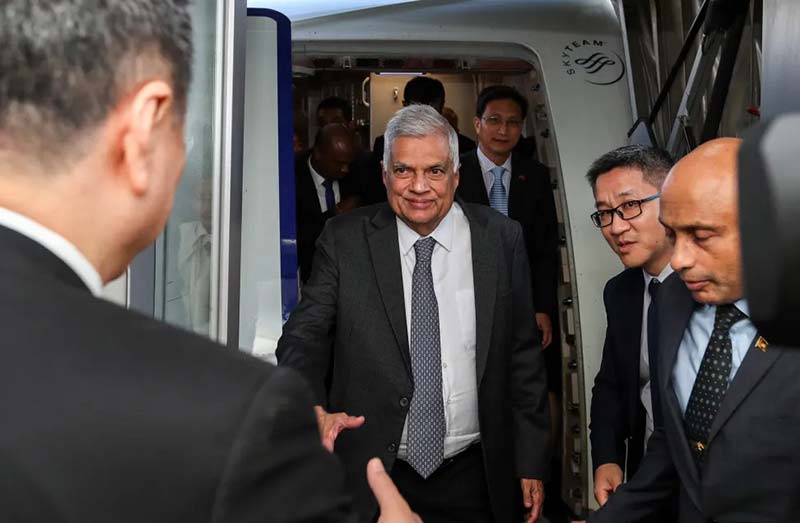
Colombo has demonstrated its own brand of strategic autonomy on issues from Russia’s war in Ukraine to China’s global footprint
By Michael Kugelman
Most South Asian governments tend to have nonaligned foreign policies, balancing their relations with major powers. This maximizes their diplomatic flexibility and ability to operate independently on the world stage, also known as strategic autonomy. India and Pakistan are two prominent examples: They both balance their relations with the United States and at least one of its core rivals (Russia and China, respectively).
But it’s important not to overlook Sri Lanka: In the last two years, Colombo has quietly and successfully navigated global conflict and great-power rivalry. Like many other countries in the region, Sri Lanka has not condemned Russia’s war in Ukraine, even though resulting price shocks exacerbated its own economic crisis in 2022. Yet it has called for an end to the war and announced new measures that step up economic and energy ties with India.
This week, Sri Lanka’s government announced a $1 million donation to assist children in Gaza affected by the Israel-Hamas war, following the establishment of a national Children of Gaza Fund calling for contributions from the Sri Lankan public. The country has previously announced other aid commitments, expressed solidarity with Palestinians, and accused the European Union of “double standards” in its approach to Gaza.
But Sri Lanka is also a close friend of Israel, which supplied arms to the Sri Lankan military during its decades-long civil war. Since the Israel-Hamas war began, Sri Lanka has reached a controversial deal that enables Israel to hire Sri Lankan workers, and its diplomats in Israel have delivered assistance and donated blood. Colombo also joined the U.S.-led military campaign against Houthi attacks in the Red Sea, making it the only South Asian country to do so.
Meanwhile, Sri Lanka has strengthened economic ties with China and already hosts many large Chinese infrastructure projects. Sri Lankan President Ranil Wickremesinghe has also embraced Beijing’s position on key issues, including the AUKUS security alliance between Australia, the United States, and the United Kingdom, which he has labeled a “mistake,” and the term “Indo-Pacific,” which he has called an “artificial framework.”
However, last November, Colombo inked a $553 million deal with the U.S. International Development Finance Corp. to support a port development project in Colombo that is backed by India’s Adani Group. In January, Sri Lanka imposed a one-year ban on Chinese research ships entering its ports. The move came soon after Wickremesinghe rejected Indian allegations that Chinese spy vessels have docked in Sri Lanka.
Sri Lanka’s actions may be driven by a commitment to strategic autonomy, but its motivations are as much about practicality as principle. The country is emerging from an acute economic crisis, and it needs as much financial assistance as it can get. It’s easier to achieve that goal when it works with all the major powers. It’s not coincidental that China, India, and the United States were three of Sri Lanka’s most generous donors during its crisis.
Wickremesinghe must also proceed cautiously during an election year for Sri Lanka. Colombo’s deals with Beijing, including the latter’s 99-year lease on the Hambantota International Port, have led to increased anti-China sentiment in the country in recent years. But the president will also do everything he can to distance himself from his wildly unpopular predecessor, Gotabaya Rajapaksa, who remains a political ally of Wickremesinghe.
Rajapaksa, who heavily courted Chinese investments while in office from 2019 to 2022, published a book last month that lambasts Beijing for providing loans that deepened Colombo’s economic crisis. This gives Wickremesinghe some incentive to show some love for China in order to distance himself from Rajapaksa’s position.
South Asia has become a battleground for geopolitical rivalry, which puts pressure on the region’s nonaligned governments to take sides. But to this point, Sri Lanka has navigated this state of affairs successfully, demonstrating the capacity of states in the global south to reinforce multipolarity in the current world order.
On Sunday, Indian Prime Minister Narendra Modi blasted the main opposition Indian National Congress party—for a diplomatic decision made 50 years ago. In 1974, then-Prime Minister Indira Gandhi negotiated an end to a maritime border dispute by recognizing Sri Lanka’s claim over Katchatheevu, a small island 20 miles off the southern coast of the Indian state of Tamil Nadu.
Modi denounced the decision as “callous” and said the Congress party has weakened India’s “unity, integrity, and interests … for 75 years and counting.” On Monday, Indian External Affairs Minister S. Jaishankar said Sri Lanka had detained more than 6,000 Indian fishermen in the last two decades, suggesting its possession of Katchatheevu has worsened the plight of communities in Tamil Nadu.
The comments are unlikely to cause tensions between India and Sri Lanka. They are clearly part of a tactic to appeal to long-standing grievances and secure votes in a Tamil Nadu, one of a few southern states where the ruling Bharatiya Janata Party has struggled to gain traction. This underscores how Modi—despite being heavily favored to win reelection in national polls that begin this month—is leaving no stone unturned on the campaign trail.
(South Asia Brief – Foreign Policy)
The writer of Foreign Policy’s weekly South Asia Brief and the director of the South Asia Institute at the Wilson Center.
Features
Electing a President: Three against one in the US, and three against three in Sri Lanka
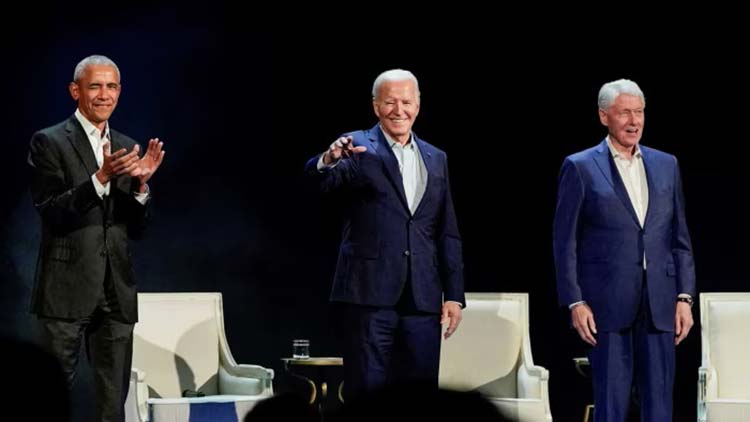
by Rajan Philips
On Thursday, in New York, President Joe Biden and his two Democratic predecessors, Barrack Obama and Bill Clinton, appeared together in a fund raising event to launch Biden’s reelection campaign against Donald Trump, their common foe and America’s ugly manifestation. The fundraiser reportedly netted in over $25 million boosting Biden’s impressive war chest which is said to be more than $150 million. Trump is handicapped with less than a third of that to spend on elections in addition to his personal financial challenges of having to cough up over half a billion dollars in penalties and damages in civil fraud and personal libel cases. The three amigos and the lone fraudster and felon represent the best and worst of America.
That Trump still has more than a fighting chance of winning in November also speaks to the turmoiled state of American society and politics in spite of its economic strength and superpower resources. He is currently facing 88 criminal charges in two federal and two state level trials. Yet he is the presumptive nominee of the Republican Party, the Party of Abraham Lincoln and Theodore Roosevelt. Trump has misappropriated the grand old party and weaponized it to serve his own ends, which primarily are to get elected as president again and pardon himself from the indictments he is facing.
But if he were elected as president for a new term, there will not only be presidential chaos in America and confusion abroad, but also the rolling back of two centuries of incremental advances in American norms and values and processes on everything from – law and order and role of government, minority rights and racial inclusion voting rights and election acceptance, women’s rights and sexual diversity, the environment and natural resources, to education, health and housing.
The effects of his judicial appointments to the Supreme Courts and lower federal courts during his first term have wreaked havoc on the judicial landscape that had been taking shape for over half a century on affirmative action, voting rights, environmental and resource protection, sexual diversity and women’s rights. The high or low point of judicial backtracking came in June 2022 with the overturning of the 1973 landmark Supreme Court ruling in Roe v. Wade that affirmed women’s constitutionally protected right to have an abortion.
A majority of the American people and a greater majority of women are opposed to the overturning of Roe v. Wade by the six conservative majority (five of them Catholics) justices of the current Court. And it is hurting the Republicans politically, but the six justices appointed by Republican Presidents (Trump, Bush Jr, and Bush Sr) are pursuing their ideological convictions in other areas. Perhaps to the embarrassment of conservative Supreme Court Justices and national Republican leaders, Republican state legislators and lower courts with Trump appointed judges have started taking the overturning of Roe v. Wade to its ridiculous extensions.
In February this year, the Alabama Supreme Court quite bizarrely ruled that embryos created through in vitro fertilization (IVF) should be considered children. Earlier in Texas, a Trump appointed conservative federal judge, Mattehew Kacsmaryk, had ordered the removal of mifepristone, a common abortion-inducing drug, from the market in a case filed by anti-abortion activists and doctors. The drug has been in use for decades after approval by the US U.S. Food and Drug Administration, an agency whose decisions are taken as guiding standards throughout the world. The mifepristone case reached the Supreme Court after appeal by the Federal government, and during oral arguments last week a majority of the Justices including conservatives clearly indicated that they are not in favour of upholding the Texas ban of the pill. The Supreme Court ruling that will come in June is expected to overturn the Texas ban by a seven-two majority.
American Anomalies
Trump is certainly keeping the Supreme Court busy, for on April 22 the Court will hear arguments to determine if a former President could be tried for alleged acts of crime during his time as President. The case is all about Trump and his exertions to overturn the results of the 2020 presidential election by inciting an insurrection on the US Capitol on January 6, 2021, when the US Congress was convening to ratify the election of Joe Biden as President. That he is a candidate in the very next election in 2024 is a uniquely American anomaly.
The anomaly is falsely premised on democracy – to let the people decide if Trump could be elected as president in spite of all that is known about him. He should have been barred from contesting and even incarcerated for violating the constitution and his oath of office to uphold it. Scores of ordinary citizens who participated in the insurrection at the urging of Trump have been and are being tried and punished including with jail terms. Lawyers who unethically worked on his brief are being professionally held accountable and are having their licenses revoked.
But Trump is a candidate, perhaps the only person to be a candidate for a third time after Franklin Roosevelt and Richard Nixon. Roosevelt, the war time president, won all three elections and died in office during his third term. But his three wins led to the 22nd Amendment in 1951 that brought in the two-term limit for presidential office. Nixon lost the first election to Kennedy, won the next two. He resigned in disgrace before his second term was over, but in abidance with the Constitution. Trump knows no shame and he is flouting the Constitution with impunity, hoping for permanent immunity by winning the election in November.
In a straight election contest, Trump has no chance of winning against anyone. He came up short, in fact very short, in the popular vote count both against Hillary Clinton in 2016 and Joe Biden in 2020. He eked out a victory against Hillary Clinton thanks to the evanescent mechanism of the Electoral College. Four years later Joe Biden turned the tables on Trump. After four more years, America is literally back to square one for electing a new president – but from the same two candidates as last time. Biden is almost certain to win again the popular vote, but the question is whether he can hold on to the handful of swing states that tilt the balance in Electoral College tally. It is also the concern for Democrats and everyone else who do not want to see another Trump presidency. It is that concern that brought the two former presidents, Clinton and Obama, to join President Biden in Thursday’s gala fundraising event in New York.
Biden, older than his two predecessors, can still pack a good punch in his speech as he showed in his annual State of the Union address to the Congress in January. But he could very much use the two former presidents to enthuse and energize the base to turn out to vote. Clinton and Obama are supremely, but differently, gifted campaigners. While Obama takes flight with his soaring eloquence, Clinton can charm and bring an audience to its feet by offering the folksiest of explanations to the most complex of issues. Obama is expected to be fully engaged in the campaign targeting young audiences, while joining Clinton and drawing on their popularity among the two communities, to canvas the African American and Latin American vote,.
Biden’s four year record as president is not at all a bad record to run on by American standards. It is indeed a good record in the circumstances. In fact, in domestic policy and social welfare programs Biden is easily the most consequential president after Lyndon Johnson, who was so himself after Franklin Roosevelt’s New Deal regime of policies. American foreign policy has never been non-controversial even in the best of times. But purely from a domestic election standpoint, Biden should be able to weather out the American political effects of the war in Ukraine and the devastation of Gaza. From any standpoint, the alternative to Biden would be dreadful. For the pruriently curious, there is also this year a Kennedy gadfly in the American ointment. That is better left for the social media.
Three against Three
Sri Lanka has a presidential system that has lasted 46 years despite all the efforts to ditch it lock, stock and barrel. Thankfully, Sri Lanka is spared of the Trumpian shenanigans of presidential politics. Perhaps the customary inertia of traditional societies provide a deterrent to upstart upheavals like Trumpism that is tantalizing the forever immigrant society of America. That does not stop quite a few Sri Lankans and others from being fascinated by and even supporting Trump. Hitler too had his admirers beyond what was then wholly non-immigrant Germany, and was recommended as a presidential role model just five years ago in Sri Lanka. That was for Gotabaya Rajapaksa who once said that he had made a study of Trump as a non-career politician. Some study, some politician! All that saga is now reduced to a weird book by a ghost writer blaming others of conspiracies.
It would be wrong to say that the presidential system alone produced a Trump in America and a Gotabaya in Sri Lanka. But it would be mostly correct to say that they would have been vetted out in a parliamentary system. Historically, America stumbled on the presidential system because the only model that was available at the time of the American revolution was the British political system, which then was mostly monarchical and only nascently parliamentary. The presidential system was a negation of the monarchy that the Americans had liberated themselves from. The model was invariably adapted and replicated in the neighbouring new countries to the south.
A much more evolved parliamentary system with only a long distance monarchical link arrived in Sri Lanka and big neighbour India. It evolved under local conditions in Sri Lanka and enabled itself to sever the monarchy and create a new republic. The imposition of the presidential system came shortly after. The question of abolishing it is still an active question and its latest manifestation is in election sequencing.
Advancing the parliamentary election is seen as a precursor to abolishing the presidency. At the same time, the long-titled Minister of Justice, Prison Affairs and Constitutional Reforms, the loquacious Wijeyedasa Rajapakshe, is musing about constitutional changes including the establishment of a Senate and electoral reforms. He has not mentioned abolition. We have been down this road before, and nothing may come out of it as usual.
As for certainty, it seems almost certain that the presidential election will be held sometime between mid-September and mid-October. What is not clear is if there will be a parliamentary election before that. The SLPP parliamentarians seem agitated to pass a resolution in parliament asking the President to dissolve parliament and have a general election before the presidential election. That is their best route for re-election and hence their anxiety.
But no one knows what the President will do. The joke on the street is that even the President is not sure what he might do. And conveniently so. Seriously, however, it is a Sri Lankan anomaly that the timing of a parliamentary election is entirely the business of the executive even if it is after two and half years of the last election.
The Election Commission, twice bitten by the Executive over local government elections, seems not at all shy about being prepared to conduct both the parliamentary and presidential elections within the current year. The EC Chairman R.M.A.L. Ratnayake is on record as having said that much. Unless a parliamentary election is held first, it now seems likely that there would be three presidential candidates – Anura Kumara Dissanayake, Sajith Premadasa, and Ranil Wickremesinghe. Three against Three.
Anura Kumara Dissanayake is the only openly committed candidate so far. Sajith Premadasa, although the presumptive candidate of the SJB, often sends mixed signals saying that he/they are ready for either election. Ranil Wickremesinghe might be feigning a Nasser-like reluctance and hoping to be sponsored by a grand alliance, but the real pressure on him will come from the SLPP and the Rajapaksas.
It would fundamentally be mendicant pressure from Basil and Mahinda to Ranil – to save their bacon, one last time, in spite of, or because of, all the previous transactions between them. Ranil’s calculation will be about the vote catchment that the Rajapaksas can muster. In any event, they would bring him more votes than he or the current UNP could ever garner. The question is if that would be enough in a three way contest to go over the 50% mark in the first count. The question applies to all three candidates, and deadlock is a possibility.
Features
Russian Presidential Election results

by Kumar David
Russia is exultant about the outcome of the Presidential election. The poll was 77% of the electorate and Putin secured 87% of the votes cast; a landslide on both counts. The voting was not rigged; why upset the show when you have this kind of triumph to your credit? To what extent Russia is democratic is a separate matter that I will discuss later on. Russians are enjoying themselves mocking America and the West: “When has your President ever won 87% of the vote in a poll where 77% of the electorate participated?” Actually, never since 1904 has the turnout at a US election exceeded 66% and, in any case direct comparison in not possible because of the American “Electoral College System”.
Putin is not a Marxist, Leninist or any brand of socialist. He is a conservative and religious Russian Nationalist. Of the three opposing candidates, only Nikolay Kharitonov of the Communist Party who secured 4.3% of the poll stood to the left of Putin. The other two, Leonid Slutsky of the Liberal Democratic Party and Vladislav Davankov of New People, both can be described as Liberals, together received 7% of the poll.
Western media is so ignorant that it did not even know the names and platforms of the three opposition candidates and lamented that Putin had been elected for a third term, that is up to 2030 but failed to mention that Angela Merkel served four terms as German Chancellor (16 years and 15 days, 10 days less than Helmut Kohl).
The first to congratulate Putin were the “usual culprits” Cuba, Venezuela and Bosnia and Herzegovina, followed by Turkey’s Erdogan and BRICS and BRICS+ leaders. The loudest and most audible sigh of relief came from President Xi of China. China, was delighted that it had not backed the wrong horse and is clearly looking forward to a period of fruitful economic cooperation. Russia has vast resources (it is the most resource rich country in the world, estimated at $75 trillion – timber, gas, oil, coal, gold and rare-earth minerals).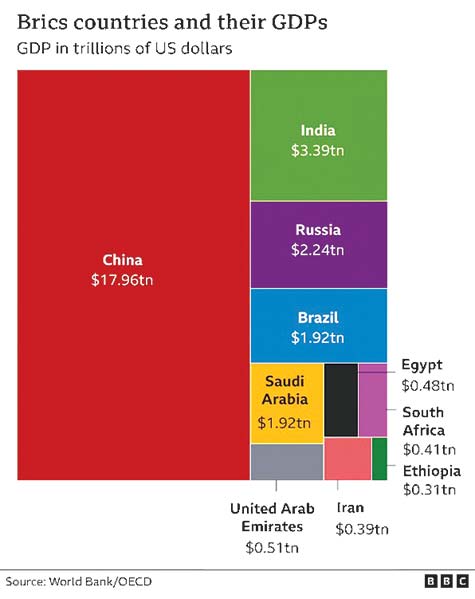
China is the world’s largest economy measured in purchasing power parity (PPP) and leads the world in 37 out of 44 critical technologies, with the West trailing behind in the race for science and research breakthroughs, a report by an Australian think tank says according to Al Jazeera Business & Economy Section, March 23, 2023. Russia’s economy is ranked eighth largest in the world in the nominal GDP terms.
The Chinese and Russians are obviously calculating that by using their combined and complementary resources and benefiting from the BRICS and the BRICS+ linkages they are in for a golden period. I have written a previous column about a global shift to the right; it seems that the opposite effect is emerging in the countries of the Global South. The multi-polarity of the world is manifesting itself in a complex way in this day and age. BRICS is typical.
BRICS
BRICS originally was a formal organisation of five countries, only, as per the acronym while BRICS+ is the term used for a much larger grouping aligned in investment and economic activities as per various doings led by China. A few weeks ago Egypt, Ethiopia, Iran and the United Arab Emirates (UAE) were formally admitted into BRICS on January 2024. Saudi Arabia is expected to join soon; so BRICS will become a nine or 10-country outfit. The activities of BRICS+, correspond to the economic investments identified, mainly, with China’s Belt & 1, Road initiatives. Decision making in BRICS (and now expanded BRICS) is formal government consultation. There are a large number of applications to join BRICS, which has to be done by formal procedure, or BRICS+ which can be on a project-by-project basis.
Assassination of Putin’s opponents
Putin is a strategic thinker and obviously wants to cash in on his now advantageous, post-election, strategic profile. He has commented more than once that American and Western democracy is bogus and “for me the opportunity to serve the people is more important than winning the election”. It is clear that he intends to contest America and Western Europe for the mantle of “true democracy”. The big obstacle that stands in his way are the murder of Alexey Navalny by his henchmen and previously of Anna Politkovskaya, a prominent journalist and a persistent chronicler of rights abuses in Chechnya, who was shot dead in her apartment in an execution-style killing on, July 16, 2009. A renowned human rights activist, her body was found in Ingushetia hours later near her home in the capital of Chechnya, Grozny.
The body of Natalya Estemirova, renowned human rights activist who had also been investigating kidnapping and murders in Chechnya, was discovered near her apartment. Sergei Yushenkov, a veteran politician and leader of the anti-Kremlin party Liberal Russia was shot in front of his Moscow home in April 2003. The former Russian security agent Aleksandr Litvinenko died in London after being poisoned with radioactive polonium-210 in November 2006. He had fled to Britain in 2000 accusing the Federal Security Service of plotting to kill oligarch Boris Berezovsky, a strong Putin opponent. He drank tea, laced with polonium in London with two Russian agents.
This is a long and shameful list and no matter how hard he tries Putin will not be able to erase the disgrace. I think a political leader in the West would not be able to conceal such a string of personal crimes, which is different from (but less heinous) than hundreds of American foreign policy and CIA crimes of overthrowing foreign governments on behalf of American policy. This is the difficulty Putin will encounter in trying to sell himself as a democrat.
Is there a lesson for nearer home in this story. Yes; if you go smudge your copybook it is not possible ever to erase that reputation. Except NM and Dudley, Colvin, Pieter and a few others, nearly all political leaders on both the left and right have muddied their copybooks in this respect.
Terror in Moscow
In the midst of all this, the massive terrorist attack on a concert hall on the outskirts of Moscow has created dire confusion. There has been 150+ deaths and many more injured. The who-done-it story is utterly confusing. Two weeks ago the US State Department issued a ‘Travel Advisory’ to US and British citizens to get the hell out of Russia because the security scene was worsening. “Why the hell didn’t you inform us?” the Russians queried; the Americans replied “We did through state-to-state channels”.
The obvious question uppermost in the media all over the world is “Who is behind the attack?” A frequent response is “It’s a Islamic State type of entity”. However, the US also claimed “Ukraine was certainly not involved”. How is the US so sure about that? God save Ukraine from Russian wrath if it did have anything to do with this terrorist attack. Actually, I think the Ukrainian government wouldn’t make such a damn-fool blunder.
How things may pan out from now on is going to be very interesting. Putin is a cleaver strategist if he is anything. He will make every effort to bolster Russia’s bargaining power vis-à-vis the Americans and try to erase pages from his blotched copybook detailing the murder of political rivals. He may also ponder building strategic bridges with the US and crafting some Russian-style democracy. We need to watch the situation for a few more weeks to see how things pan out. As Rumsfeld would put it “These are unknown unknowns” but don’t hold your breath, Putin is no Muscovite version the great Athenian statesman Pericles.
-

 Business4 days ago
Business4 days agoCEAT Kelani launches three new radial tyre variants in ‘Orion Brawo’ range
-

 Business6 days ago
Business6 days agoDialog-Airtel Lanka merger comes centre stage
-

 Business3 days ago
Business3 days agoCeyline Travels and MBA Alumni Association of University of Colombo sign MOU
-

 Business6 days ago
Business6 days agoSLFEA appoints JAT as a Facilitation Partner for training painters to provide overseas employment opportunities
-

 Business4 days ago
Business4 days agoHayleys Fabric celebrates triple triumph at ISPO Textrends Spring/Summer 2026
-

 Business5 days ago
Business5 days agoUrgent appeal from Sri Lankan exporters on rupee appreciation
-

 Business3 days ago
Business3 days agoMaldivian to launch direct flights to Colombo
-

 Sports4 days ago
Sports4 days agoHello Madras, ‘ai api kaluda?’














